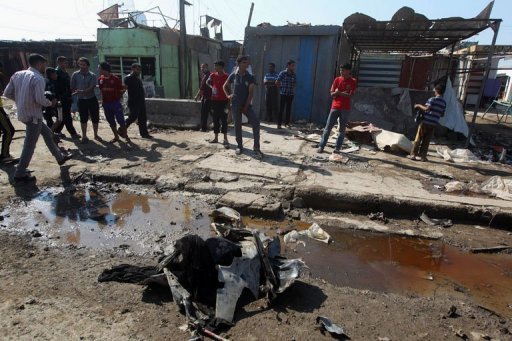Iraqi authorities tightened security on Sunday, a day after attacks mostly targeting Shiite Muslims during the Eid al-Adha holiday killed 31 people in the country’s deadliest day this month.
The shootings and bombings, which also wounded more than 100 people, were the latest in a spate of violence in the past week that has broken a relative calm, and came even though authorities had announced moves to boost security during the four-day Eid break which began on Friday.
No group has yet claimed responsibility for Saturday’s attacks, but Sunni militants typically look to target Shiite pilgrims during Muslim holidays such as Eid or Shiite commemoration ceremonies.
In Baghdad, where Saturday’s deadliest attacks struck, security forces tightened searches at existing checkpoints, AFP journalists reported, though traffic remained light with fewer cars on the streets as a result of Eid.
Tougher security measures in the form of stricter checkpoint searches and vehicle curfews are common in the aftermath of major attacks in Iraq.
In the Shiite bastion of Sadr City, northeast Baghdad, twin car bombs left 13 people dead and 52 wounded, officials said, while a bombing in a market in Maamal neighbourhood killed five people, including three children and a woman, and wounded 13.
An AFP journalist at the scene of the latter attack reported pools of blood along the street, and pieces of shrapnel mixed with vegetables scattered on the ground.
Twin blasts in a mostly Sunni neighbourhood of west Baghdad, meanwhile, killed a policeman and wounded five others.
Another bombing in Taji, just north of Baghdad, against a minibus ferrying Shiite pilgrims, at least some of whom were Iranian, killed five of the passengers and wounded 12, according to security and medical officials.
Attacks in the predominantly Shiite town of Muqdadiyah, and against a Shiite religious foundation’s offices in Tuz Khurmatu, killed two people and wounded 13 others.
Shiites in Iraq typically use the Eid holiday, which began on Friday, to visit relatives, the graves of dead family members or shrines of key figures in Shiite Islam across the country.
In the run-up to the holiday, authorities in several provinces, including Baghdad, announced tightened security, apparently to no avail.
In Mosul, 350 kilometres (220 miles) north of Baghdad, three attacks targeting the tiny Shabak community, who speak a distinct language and follow a faith that is a blend of Shiite Islam and local beliefs, killed five people and wounded 10, officials said.
The community numbers about 30,000 people living in 35 villages in Nineveh.
They were persecuted under former Iraqi dictator Saddam Hussein, and after the 2003 US-led invasion they were targeted several times by Al-Qaeda.
Levels of violence have declined dramatically in Mosul and nearby towns and villages, but the city that was once an Al-Qaeda stronghold is widely cited as one of the places where the network’s Iraqi front still holds sway.
The death toll from Saturday’s violence was the highest since 33 people were killed in nationwide attacks on September 30.

COMMENTS
Please let us know if you're having issues with commenting.